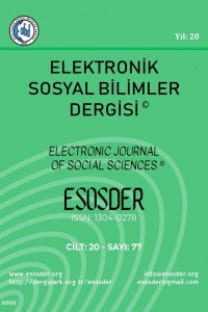İNGİLİZ DİLİ ÖĞRETMEN ADAYLARI VE İNGİLİZCE ÖĞRETMENLERİNE GÖRE YETERLİ BİR İNGİLİZCE ÖĞRETMENİNİN ÖZELLİKLERİ
ÖZ Bu çalışmada etkili bir İngilizce öğretmeninde bulunması gereken nitelikler İngilizce öğretmeni adayları ve İngilizce öğretmenlerinin bakış açılarıyla incelenmekte ve sonuçlar tartışılmaktadır. Niteliksel ve niceliksel yöntemlerin birlikte kullanıldığı bu çalışmada veriler yüz yüze yapılan görüşmeler ve geliştirilmiş bir anket aracılığıyla toplanmıştır. Araştırma soruları etkili bir İngilizce öğretmeninde bulunması gereken niteliklerin ve aday öğretmenlerin halen öğretmenlik yapmakta olan İngilizce öğretmenlerini yeterli buldukları alanların neler olduğudur. Buna ek olarak, öğretmenlerin kendilerini hangi alanlarda yeterli gördükleri de araştırma soruları arasındadır. Araştırmanın sonuçları aday öğretmenlerin öğretmenleri yetersiz gördükleri alanların sayıca çok olduğunu ve öğretmenlerin de hizmet içi eğitim programlarının yetersizliğinden ve çok sık değişen ders programlarının kendilerini olumsuz yönde etkilediğinden şikayetçi olduğunu içermektedir. Anahtar Kelimeler: İngilizce, hizmet içi, aday öğretmen, İDE, öğretmen, yeterli, öğretmen yetiştirme
Anahtar Kelimeler:
İngilizce, hizmet içi, aday öğretmen, İDE, öğretmen, yeterli, öğretmen yetiştirme
EFFECTIVE ENGLISH LANGUAGE TEACHER FROM THE PERSPECTIVES OF PROSPECTIVE AND IN-SERVICE TEACHERS IN TURKEY
ABSTRACT In this study, the ideal and actual characteristics of an effective English language teacher are studied from the perspectives of prospective and in-service teachers of English. By using a mixed method design, data were collected through interviews with prospective and in-service teachers of English and a survey distributed to prospective teachers of English. The aim of the study was to find the characteristics of the effective English language teacher from the perspectives of the participants, whether or not in-service teachers are found to be effective from the perspective of prospective teachers, and how in-service teachers evaluate themselves as effective teachers. Apart from unearthing the qualities attached to the effective teacher, findings have shown that majority of the prospective teachers do not regard their mentors (in-service teachers) effective. Similarly, in-service teachers claim that not having proper in-service training programs and an updated curriculum, makes it difficult to be an effective teacher of English in their schools. Key Words: English, in-service, prospective teacher, ELT, teacher, effective, teacher education
Keywords:
-,
___
- Arikan, A. (2002). A struggle for power in teacher development programs: A postmodern critical study. Unpublished doctoral dissertation. The Pennsylvania State University: University Park.
- Arikan, A. (2006). Postmethod condition and its implications for English language teacher education. Journal of Language and Linguistic Studies, 2(1), 1-11.
- Arikan, A., Taşer, D., Saraç-Süzer, H. S. (2008). The Effective English Language Teacher from the Perspectives of TurkishPreparatory School Students. Eğitim ve Bilim, 33(150), 42-51.
- Arnon, S., & Reichel, N. (2007) 'Who is the ideal teacher? Am I? Similarity and difference in perception of students of education regarding the qualities of a good teacher and of their own qualities as teachers', Teachers and Teaching, 13(5), 441-464.
- Bahous, J., & Kfouri, C. (2007). Assessing the worthiness of in-service workshops in Lebanon. The Near and Middle Eastern Journal of Research in Education, 2(1), 12- 21.
- Cheung, H. Y. (2006). The measurement of teacher effectiveness: Hong Kong primary in- service teachers. Journal of Education for Teaching, 32(4), 435–451.
- Demirel, Ö. (1990). Yabancı dil öğretmenlerinin yeterlikleri. Hacettepe University Journal of Education, 5, 133-165.
- Dressel, P. L. (1987). Mission, organization and leadership. Journal of Higher Education, 58, 101-109.
- Kurbanoğlu, S. S. (2004). Öz-yeterlik inancı ve bilgi profesyonelleri için öneri. Bilgi Dünyası, 5(2), 137-152.
- Küçüksüleymanoğlu, R. (2006). In-service training of ELT teachers in Turkey between 1998- 2005. Uludağ Üniversitesi Eğitim Fakültesi Dergisi, 19(2), 359-369.
- Sağlam, A. Ç., & Sağlam, M. (2004). Öğretmenlik uygulaması ve okul deneyimi derslerinin yürütülmesinde karşılaşılan sorunlar ve çözüm önerileri. Çağdaş Eğitim Dergisi, 29(305), 18-25.
- Saraç-Süzer, S. H. (2007). Examining methodological issues through pedagogical and practical knowledge of experienced teachers: A case study. Unpublished doctoral dissertation, Hacettepe University: Ankara.
- Tschannen-Moran, M., & Hoy, A. W. (2001). Teacher effectiveness: capturing an elusive construct, Teaching and Teacher Education, 17, 783–805.
- Okan, Z., & Başaran, S. (2007). Türkiye‟nin İngilizce öğretmeni yetiştirme politikası. Türkiye’de yabancı dil eğitimi kongresi bildiriler kitabı, Ankara, 181-187.
- Öğretmenlik mesleği genel yeterlikleri. (2006). T. C. Milli Eğitim Bakanlığı Tebliğler Dergisi. 69(2590). Ankara: Yayımlar dairesi başkanlığı.
- Yavuz, A. (2007). Understanding student teachers‟ effectiveness through journals at an English language teaching department: A Turkish university case. Mediterranean Journal ofEducational Studies, 12(2), 19-43.
- ISSN: 1304-0278
- Yayın Aralığı: Yılda 4 Sayı
- Başlangıç: 2002
- Yayıncı: Cahit AYDEMİR
Sayıdaki Diğer Makaleler
ÜNİVERSİTE ÖĞRENCİLERİNİN HARCAMALARININ KENT EKONOMİSİNE KATKISI(Uşak Üniversitesi Örneği)
İslam Ekonomisi ve Finansının Temelleri: Teori ve Uygulama
SANAT ESERLERİNDE KORKU İMAJI VE KORKU DUYGUSU YENEBİLMEDE SANATIN ROLÜNÜN İRDELENMESİ
PİYANO SINAVI DEĞERLENDİRME ÖLÇEĞİNİN PUANLAYICILARA YÖNELİK GEÇERLİK VE GÜVENİRLİĞİ
YAZOKULU UYGULAMASIN NEDENİNE İLİŞKİN ÖĞRENCİ GÖRÜŞLERİ
AY. m 36 BAĞLAMINDA ŞİKAYET HAKKI İLE İLGİLİ BİR VAKIA İNCELEMESİ-YARGITAY İÇTİHAT ELEŞTİRİSİ
KAVRAM ÇARKI DİYAGRAMININ ÖĞRENME BAŞARISINA ETKİSİ
Salim ORAK, Ferhat ERMİŞ, Mustafa YEŞİLYURT, Ömer Faruk KESER
